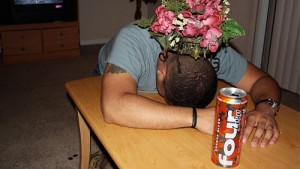In 2009, US attorney generals banned the selling of beverages containing both alcohol and caffeine. Namely to target one brand: Four Loko.
Created by a small start up company of three Fraternity brothers, Phusion LLC marketed the Four Loko malt liquor with colorful cans of more-than-one-glass proportions. When the bad press for the drink began it was mostly due to the notion that Phusion was targeting an underaged customer in the attempts of serving them a ‘blackout in a can’. The argument strengthened when a group of teenagers were hospitalized due to alcohol poisoning from the drink.
In hindsight the ban on mixing caffeine and alcohol in one product was a bit of a witch hunt. No one ever stops an adult from buying an Irish coffee at a bar, yet some how it’s morally more viable. Phusion was able to see a niche opportunity for a product and capitalized on it as an entrepreneur is wont to do. The argument that they were targeting minors has legitimacy up until a customer realizes they can buy the Red Bull that is placed next to Four Lokos in a gas station. The colors are no different than those on non-alcoholic mixers like grenadine.
What Four Loko really teaches us is how bad press can escalate and destroy a product. Reporters can quickly echo off of each other and apply a lot of pressure to third party authorities. Especially when it comes to American culture and ‘vice’ products like alcohol. Despite the counter arguments, Phusion quite happily conceded to the ban of their product and bounced back with a non-caffeinated version. According to them, sales are still going fine despite the controversy. In reality I guess it is hard to defend a drink created by fraternity brothers, promoted by cheap hip hop artists, sold in the back of gas stations and binged by sixteen year olds.

